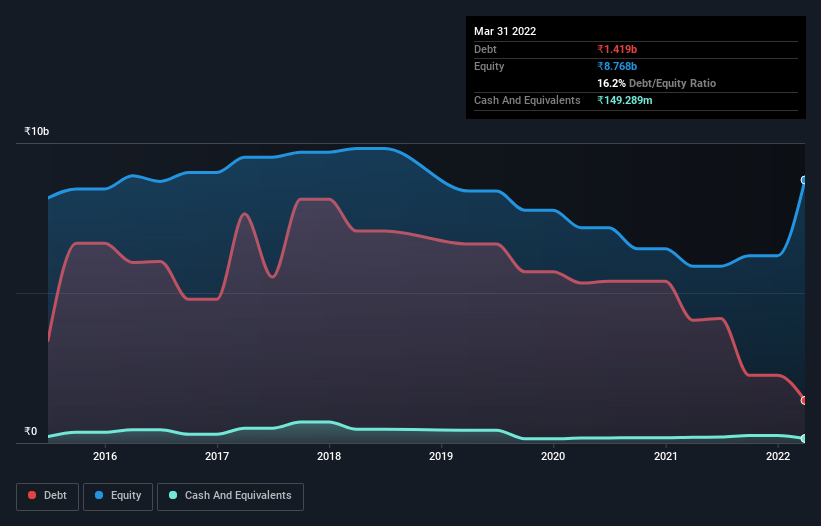Warren Buffett famously said, 'Volatility is far from synonymous with risk.' When we think about how risky a company is, we always like to look at its use of debt, since debt overload can lead to ruin. Importantly, Ganesh Housing Corporation Limited (NSE:GANESHHOUC) does carry debt. But is this debt a concern to shareholders?
When Is Debt A Problem?
Debt assists a business until the business has trouble paying it off, either with new capital or with free cash flow. Part and parcel of capitalism is the process of 'creative destruction' where failed businesses are mercilessly liquidated by their bankers. However, a more usual (but still expensive) situation is where a company must dilute shareholders at a cheap share price simply to get debt under control. Of course, plenty of companies use debt to fund growth, without any negative consequences. When we think about a company's use of debt, we first look at cash and debt together.
Check out our latest analysis for Ganesh Housing
What Is Ganesh Housing's Debt?
The image below, which you can click on for greater detail, shows that Ganesh Housing had debt of ₹1.42b at the end of March 2022, a reduction from ₹4.09b over a year. However, it does have ₹149.3m in cash offsetting this, leading to net debt of about ₹1.27b.

How Strong Is Ganesh Housing's Balance Sheet?
Zooming in on the latest balance sheet data, we can see that Ganesh Housing had liabilities of ₹2.24b due within 12 months and liabilities of ₹790.2m due beyond that. Offsetting these obligations, it had cash of ₹149.3m as well as receivables valued at ₹1.25b due within 12 months. So its liabilities outweigh the sum of its cash and (near-term) receivables by ₹1.62b.
Given Ganesh Housing has a market capitalization of ₹19.4b, it's hard to believe these liabilities pose much threat. But there are sufficient liabilities that we would certainly recommend shareholders continue to monitor the balance sheet, going forward.
In order to size up a company's debt relative to its earnings, we calculate its net debt divided by its earnings before interest, tax, depreciation, and amortization (EBITDA) and its earnings before interest and tax (EBIT) divided by its interest expense (its interest cover). This way, we consider both the absolute quantum of the debt, as well as the interest rates paid on it.
While Ganesh Housing's low debt to EBITDA ratio of 0.95 suggests only modest use of debt, the fact that EBIT only covered the interest expense by 3.6 times last year does give us pause. But the interest payments are certainly sufficient to have us thinking about how affordable its debt is. Notably, Ganesh Housing made a loss at the EBIT level, last year, but improved that to positive EBIT of ₹1.3b in the last twelve months. There's no doubt that we learn most about debt from the balance sheet. But it is Ganesh Housing's earnings that will influence how the balance sheet holds up in the future. So when considering debt, it's definitely worth looking at the earnings trend. Click here for an interactive snapshot.
Finally, while the tax-man may adore accounting profits, lenders only accept cold hard cash. So it's worth checking how much of the earnings before interest and tax (EBIT) is backed by free cash flow. In the last year, Ganesh Housing's free cash flow amounted to 27% of its EBIT, less than we'd expect. That weak cash conversion makes it more difficult to handle indebtedness.
Our View
When it comes to the balance sheet, the standout positive for Ganesh Housing was the fact that it seems able handle its debt, based on its EBITDA, confidently. However, our other observations weren't so heartening. For instance it seems like it has to struggle a bit to cover its interest expense with its EBIT. When we consider all the factors mentioned above, we do feel a bit cautious about Ganesh Housing's use of debt. While we appreciate debt can enhance returns on equity, we'd suggest that shareholders keep close watch on its debt levels, lest they increase. The balance sheet is clearly the area to focus on when you are analysing debt. But ultimately, every company can contain risks that exist outside of the balance sheet. For example, we've discovered 3 warning signs for Ganesh Housing (2 are significant!) that you should be aware of before investing here.
When all is said and done, sometimes its easier to focus on companies that don't even need debt. Readers can access a list of growth stocks with zero net debt 100% free, right now.
New: Manage All Your Stock Portfolios in One Place
We've created the ultimate portfolio companion for stock investors, and it's free.
• Connect an unlimited number of Portfolios and see your total in one currency
• Be alerted to new Warning Signs or Risks via email or mobile
• Track the Fair Value of your stocks
Have feedback on this article? Concerned about the content? Get in touch with us directly. Alternatively, email editorial-team (at) simplywallst.com.
This article by Simply Wall St is general in nature. We provide commentary based on historical data and analyst forecasts only using an unbiased methodology and our articles are not intended to be financial advice. It does not constitute a recommendation to buy or sell any stock, and does not take account of your objectives, or your financial situation. We aim to bring you long-term focused analysis driven by fundamental data. Note that our analysis may not factor in the latest price-sensitive company announcements or qualitative material. Simply Wall St has no position in any stocks mentioned.
About NSEI:GANESHHOU
Ganesh Housing
Engages in the real estate and construction businesses in India.
Flawless balance sheet with solid track record and pays a dividend.
Market Insights
Community Narratives



